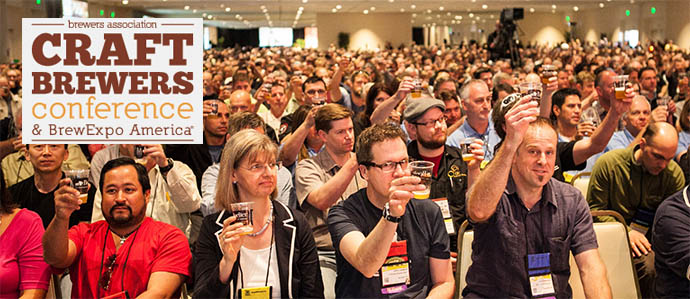
This year’s CBC offered up a vast array of seminar opportunities, and every one that we attended was insightful. Here are some of the key points that we picked up from the panels we attended.
 Marketing 101 for the Start-up Brewery
Marketing 101 for the Start-up Brewery
speakers: Abby Berman (The Rosen Group), Julia Herz (CraftBeer.com/Brewers Association), and Ginger Johnson (Ginger Johnson Marketing/Women Enjoying Beer)
There are approximately 4,400 craft breweries in the United States and simply having a great beer isn’t enough to get you noticed. Marketing is just as important for the future of your company as your brewhouse. It’s a fundamental process that needs to be handled by a professional and should not be simply lumped into a Sales position. Forbes has estimated that 14% of start-up businesses fail due to poor marketing.
Marketing is all about communication, finding opportunities and educating your market. The message your company portrays must be positive and attract and motivate the consumer towards your product. There are dozens of ways to market your product but it’s important to always make your strategy about your consumer and not about yourself.
Market research is critical and understanding who your customers are, what they want, why they want it and how and where they get it and where they get it is just as important. It’s wrong to assume that your core customer is “anyone who drinks beer.” There are so many niche markets that can help you grow your business if you target them directly.
Overall, don’t underestimate your need for a well thought out marketing strategy. It doesn’t always require a large capital investment to communicate with your customer base but it does require a focused plan.
 Growing Up as a Brewery: Strategies for Staying Small and Beautiful
Growing Up as a Brewery: Strategies for Staying Small and Beautiful
speakers: Jeff Althouse (Oakshire Brewing), Natalie Cilurzo (Russian River Brewing Co.), Sam Holloway (CraftingAStrategy.com) and John Lenzini (Schilling Beer Co.)
Increasing production output isn’t the only way to grow within the craft beer industry. There are many different ways to reinvest in quality (equipment and personnel), innovation, profitability (buying out investors) and sustainability. However, staying small doesn’t come without its challenges and a focus on retail sales is the key to succeed. You will need to have a space that will allows you to be the best advocate for your beer while focusing on quality control.
It’s estimated that Russian River’s Pliny the Younger beer release brought in $2.4 million to Sonoma County so being a part of your community and giving back is very important. They need to accept you in order for your business to grow.
Some wholesale distribution can be positive but make sure the product stays close to home and keep an eye on packaging and shipping costs. It can also be a great tool to increase exposure.
Most importantly, be yourself and know your plan. Maintain your business identity and figure out what are the best ways for your business to grow.
Crowdtasting: A New Approach to Beer and Food
speakers: Pat Fahey (Cicerone Certification Program), Nicole Garneu Ph.D. (Denver Museum of Nature and Science), Julia Herz (CraftBeer.com/Brewers Association) and Randy Mosher (5 Rabbit Cerveceria)
Crowdtasting is all about taking a scientific approach to how beer and food are tasted and paired. The two key goals of this method are to create “research backed interactions” and a “universal lexicon” that will help to elevate beer pairings and help tasters speak with commonality.
They have also released a “flavor map” which will serve to replace the outdated flavor wheel, which has been used since the 1970’s. The Brewer’s Association has also created a Beer and Food Working Group to continue studying these topics.
 Hiring and Brewer Retention: A Brewer’s Perspective
Hiring and Brewer Retention: A Brewer’s Perspective
speakers: Scott Dietrich (Victory Brewing Co.), Matt Johnson (Karl Strauss Brewing Co.), Jeremy Moynier (Stone Brewing Co.), Mitch Steele (Stone Brewing Co.) and Andrew Sturm (New Belgium Brewing Co.)
As the craft beer industry continues to grow, breweries are on the look out for new talent but also must work to retain current brewers in order to make large growth transitions. Breweries are looking for workers (experienced or not) with a passion for beer, a “can do” attitude and strong communication skills. Be honest while interviewing candidates and get to know them as individuals.
It’s hard to keep such a monotonous job fresh but by cross training employees, fostering an environment of creativity and embracing a level of transparency, your brewery employees will come to appreciate your business culture. Make sure you are still paying your employees a competitive wage. Take the time to do research on what other similarly sized manufacturing businesses are paying their employees to structure your own. Removing money from the equation will allow you to focus on other programs for your employees.
It will become increasingly difficult to maintain a culture as your business grows but continuing to communicate throughout the expansion process will ease the pain.
Beer Complaints: How to Handle Customer Feedback and Improve Your Process
speakers: Rick Blankemeier (Stone Brewing Co.) and Gwen Conley (The Lost Abbey/Port Brewing Co.)
It’s important to stop thinking about feedback as complaints. The craft beer consumer is passionate and if they are taking the time to send you unsolicited feedback (positive or negative), you should thank them.
It’s important to respond quickly to customers and doing so is the easiest and most effective way to diffuse the situation. Take time to listen to and acknowledge their concerns with empathy and respect but take time to empower, educate and even offer compensation for their feedback. Many times, the consumer is a fan of your beer and will continue to buy your beer but noticed something was off in a particular batch.
Stone Brewing Co. has a fantastic “fan feedback form” that consolidates feedback and allows the brewery to get to the heart of the issue and resolve it quickly.
If you handle these interactions successfully you can increase your customer loyalty, reduce attrition, save money by retaining customers, create an inflow of free information to your brewery and create educational opportunities.
 American Craft Beer The Best Craft Beer, Breweries, Bars, Brewpubs, Beer Stores, And Restaurants Serving Serious Beer.
American Craft Beer The Best Craft Beer, Breweries, Bars, Brewpubs, Beer Stores, And Restaurants Serving Serious Beer.
